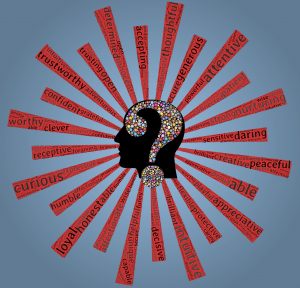What Is Self-Improvement and Why Does It Matter?
Self-improvement—often called personal development or self-growth—is the conscious process of becoming a better version of yourself. Whether it’s boosting mental health, adopting new habits, developing emotional intelligence, or pursuing meaningful goals, self-improvement is about evolving into your highest potential.
So, why does it matter?
In a world filled with distractions, high stress, and constant comparison, focusing on how to work on yourself has become a vital survival skill. According to research published in Psychological Science, those committed to personal development experience increased life satisfaction, emotional resilience, and improved mental wellness.
Self-improvement matters because it puts you back in control of your life. It’s the antidote to stagnation and the driver behind success, happiness, and inner peace.
 The Psychology Behind Personal Growth
The Psychology Behind Personal Growth
Understanding personal growth begins with understanding your mindset. Psychologist Carol Dweck coined the terms “fixed mindset” and “growth mindset”, highlighting how our beliefs about our abilities shape our lives.
People with a growth mindset believe their skills can improve with effort, learning, and feedback. They seek challenges, embrace failure, and value continuous learning. Those with a fixed mindset, on the other hand, avoid risks and see failure as a threat to their identity.
This psychological perspective emphasizes that cognitive flexibility and emotional intelligence are essential to self-growth. Behavioral change stems not just from willpower, but from rewiring beliefs, recognizing self-sabotage, and aligning with intrinsic motivations.
Key practices:
- Journaling for personal growth
- Daily affirmations
- Shadow work and healing
- Self-reflection questions
- Practicing gratitude daily
How to Start Your Self-Improvement Journey (Even If You Feel Stuck)
Feeling stuck is often the first signal that your soul is craving growth.
To begin your self-discovery journey, follow these actionable steps:
1. Self-Awareness Techniques to Begin Your Self-Improvement Journey
Start by identifying areas in your life where you feel unfulfilled. Ask reflective questions like:
- What drains my energy daily?
- Which habits keep me stuck?
- What values guide my decisions?
2. How to Set SMART Goals for Personal Growth
Specific, Measurable, Achievable, Relevant, and Time-bound goals—commonly known as SMART goals—are crucial for effective self-improvement.
3. Decluttering for Clarity and Self-Growth
Decluttering for clarity isn’t just about physical space—it’s about making mental room for new growth.
4. Build a Daily Routine to Support Your Self-Improvement
Morning routine ideas that include movement, silence, and planning can change the tone of your entire day.
The Best Self-Improvement Books for Personal Development
Books offer timeless wisdom and practical strategies for inner growth. Here are some best books for self-improvement across various domains:
- “Atomic Habits” by James Clear – Master habit stacking and building better habits.
- “The 7 Habits of Highly Effective People” by Stephen Covey – Learn principles for proactive living.
- “Can’t Hurt Me” by David Goggins – Build mental resilience and overcome fear of failure.
- “Mindset” by Carol Dweck – Shift from fixed to growth mindset.
- “The Power of Now” by Eckhart Tolle – Explore mindfulness and the present moment.
Reading 10 minutes a day can spark long-term transformation. These books provide a mix of self-help, psychology, and motivational strategies rooted in real-world experience.
Productivity vs. Busyness: What’s the Difference?
Many people confuse being busy with being productive. But they are not the same.
- Busyness is about looking active, often with low-value tasks.
- Productivity focuses on outcomes and impact.
Ask yourself: “Are my daily actions aligned with my goals, or am I just staying busy to avoid discomfort?”
Actionable strategies:
- Use the Eisenhower Matrix to prioritize tasks.
- Apply the 80/20 Rule: Focus on the 20% of efforts that yield 80% of results.
- Practice time management skills for growth, not just survival.
Proven Daily Habits That Will Transform Your Life
Habits create the framework for your identity. The following daily behaviors, backed by science, drive real transformation:
- Practice gratitude daily – Write down 3 things you’re grateful for.
- Learn a new skill or language – Cognitive flexibility grows with learning.
- Move your body – A 20-minute walk enhances mental clarity.
- Meditate for 10 minutes – Boosts mindfulness and emotional regulation.
- Review your goals – Keep SMART goals visible and actionable.
These sustainable habits are the foundation of self-care strategies and personal growth.
30-Day Challenge: How to Build Better Habits That Stick
Want a complete reset? Take on a 30-day challenge.
Choose one focus area:
- Emotional maturity → Daily journaling
- Mental clarity → Declutter one item a day
- Physical wellness → 10,000 steps a day
- Self-awareness → One self-reflection question daily
Why it works:
- Creates consistency
- Builds momentum
- Reinforces identity change
Track progress visually—use apps or habit trackers to celebrate micro-wins. Success lies in habit stacking and not relying on motivation alone.
Top Self-Improvement Activities Backed by Science
Looking for high-impact actions? Here are science-backed self-improvement tools:
- Mindfulness Meditation
- Lowers cortisol, increases attention span.
- Journaling for Clarity
- Enhances emotional intelligence.
- Strength Training
- Improves mood and self-esteem.
- Working with a Mentor
- Accountability accelerates success.
- Learning via Audio Books or Courses
- Embrace continuous learning.
- Volunteering
- Boosts personal confidence and community connection.
Self-Discipline vs. Motivation: Which One Really Matters?
Motivation may start your journey, but discipline sustains it.
- Motivation is emotional and fluctuates.
- Discipline is behavioral and reliable.
Use discipline to override emotional states. Build routines that support consistency. Remember, it’s easier to act your way into a new mindset than wait to “feel motivated.”
Overcoming Self-Sabotage and Negative Thought Patterns
Many of us have unconscious patterns that block success.
Common signs:
- Procrastination
- Negative self-talk
- Perfectionism
- Fear of failure
To overcome self-sabotage:
- Increase self-awareness techniques
- Use cognitive behavioral therapy tools
- Affirm progress over perfection
- Forgive and let go of past setbacks
This process is part of the inner growth journey and essential for sustainable transformation.
Time Management Strategies for Busy Professionals
Time is your most valuable resource.
Top strategies:
- Time-blocking with color-coded calendars
- Setting boundaries for deep work
- Saying “no” without guilt
- Utilizing Pomodoro Technique (25/5-minute cycles)
- Delegating low-priority tasks
Mastering time management means making time for what matters—your self-growth, relationships, and well-being.
Morning and Evening Routines That Maximize Your Energy
Your routines shape your outcomes.
Morning Routine Ideas:
- Wake up early for stillness
- Exercise or stretch for 15 minutes
- Set 3 key goals
- Practice gratitude and daily affirmations
Evening Routine Ideas:
- Digital detox an hour before bed
- Reflect using a self-improvement journal
- Set tomorrow’s priorities
- Practice meditation or breathwork
Healthy routine habits protect your mental bandwidth and fuel consistent progress.
How to Improve Emotional Intelligence and Build Better Relationships
Emotional Intelligence (EQ) is the ability to recognize, manage, and express emotions—yours and others’.
To build EQ:
- Practice empathy daily
- Name your feelings accurately
- Respond, don’t react
- Use active listening
- Cultivate vulnerability in relationships
Improving EQ leads to stronger connections, deeper trust, and better conflict resolution—critical components of mental health and wellness.
The Dark Side of Self-Improvement Culture
While self-help is empowering, it can become toxic.
Watch out for:
- Perfectionism masked as progress
- Constant comparison to influencers
- Productivity addiction
- Lack of rest and play
True self-improvement should heal, not pressure. Sometimes the most powerful act is to rest, forgive yourself, and pause.
Why You’re Addicted to Productivity (And What to Do About It)
Do you feel guilty when resting?
That’s a sign you might be addicted to productivity. This stems from believing your worth is tied to output.
Counter this by:
- Prioritizing play and creativity
- Detaching identity from performance
- Embracing mindfulness and meditation benefits
- Practicing self-compassion
How to Reset Your Life at Any Age
It’s never too late to start fresh.
Steps for a life reset:
- Assess your life wheel: relationships, career, health, growth
- Let go of limiting beliefs
- Set 3 bold new goals
- Build healthy lifestyle habits
- Reconnect with joy and purpose
Reinvention is not about age—it’s about courage.
Coaching vs. Self-Led Development: Which Is Right for You?
Coaching for self-improvement can accelerate growth through personalized guidance.
Benefits of coaching:
- Accountability
- Expert feedback
- Emotional support
However, self-led development builds autonomy and resilience. You can blend both approaches depending on your goals.
The Role of Stoicism and Philosophy in Modern Self-Development
Stoic philosophy teaches us to focus on what we can control and accept what we can’t.
Principles of Stoicism:
- Control your response, not external events
- Practice negative visualization
- Accept impermanence
Modern thinkers use stoicism to navigate chaos with clarity. Philosophy supports the inner growth process by aligning values with action.
Mental Health and Self-Improvement: Finding the Right Balance
Too much emphasis on productivity can harm mental health. Striking a balance is crucial.
Tips:
- Use self-care strategies proactively
- Rest when needed
- Seek professional therapy if overwhelmed
- Avoid toxic positivity
Self-improvement should feel empowering, not exhausting.
The Future of Personal Growth in the Age of AI and Technology
AI-driven tools are reshaping self-improvement.
Emerging trends:
- AI mental wellness coaches
- Personalized learning platforms
- Habit-tracking apps with biometric data
- VR-based exposure therapy
While tech supports growth, don’t forget human connection, nature, and reflection—core to your self-discovery journey.
Conclusion: Your Self-Improvement Journey Starts Today
Self-improvement isn’t about fixing yourself—it’s about remembering who you truly are. By embracing daily habits, cultivating mindfulness, and staying open to growth, you empower yourself to live fully and intentionally.
Whether you’re beginning your journey or refining your path, keep evolving. Your best self is already within you—waiting to be uncovered.

